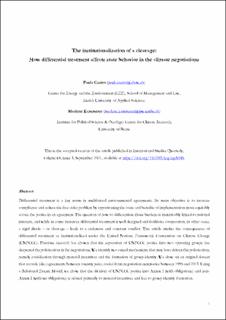Please use this identifier to cite or link to this item:
https://doi.org/10.21256/zhaw-23566Full metadata record
| DC Field | Value | Language |
|---|---|---|
| dc.contributor.author | Castro Pareja, Paula Mónica | - |
| dc.contributor.author | Kammerer, Marlene | - |
| dc.date.accessioned | 2021-11-29T09:17:36Z | - |
| dc.date.available | 2021-11-29T09:17:36Z | - |
| dc.date.issued | 2021 | - |
| dc.identifier.issn | 0020-8833 | de_CH |
| dc.identifier.issn | 1468-2478 | de_CH |
| dc.identifier.uri | https://digitalcollection.zhaw.ch/handle/11475/23566 | - |
| dc.description.abstract | Differential treatment is a key norm in multilateral environmental agreements. Its main objective is to increase compliance and reduce the free-rider problem by apportioning the costs and benefits of implementation more equitably across the parties in an agreement. The question of how to differentiate those burdens is inextricably linked to national interests, and while in some instances differential treatment is well designed and facilitates cooperation, in other cases a rigid divide—or cleavage—leads to a stalemate and constant conflict. This article studies the consequences of differential treatment as institutionalized under the United Nations Framework Convention on Climate Change (UNFCCC). Previous research has shown that the separation of UNFCCC parties into two opposing groups has deepened the polarization in the negotiations. We identify two causal mechanisms that may have driven this polarization, namely socialization through material incentives and the formation of group identity. We draw on an original dataset that records (dis)agreements between country pairs, coded from negotiation summaries between 1995 and 2013. Using a relational events model, we show that the division of UNFCCC parties into Annex I (with obligations) and non-Annex I (without obligations) is related primarily to material incentives and less to group identity formation. | de_CH |
| dc.language.iso | en | de_CH |
| dc.publisher | Oxford University Press | de_CH |
| dc.relation.ispartof | International Studies Quarterly | de_CH |
| dc.rights | Licence according to publishing contract | de_CH |
| dc.subject.ddc | 363: Umwelt- und Sicherheitsprobleme | de_CH |
| dc.title | The institutionalization of a cleavage : how differential treatment affects state behavior in the climate negotiations | de_CH |
| dc.type | Beitrag in wissenschaftlicher Zeitschrift | de_CH |
| dcterms.type | Text | de_CH |
| zhaw.departement | School of Management and Law | de_CH |
| zhaw.organisationalunit | Zentrum für Energie und Umwelt (CEE) | de_CH |
| dc.identifier.doi | 10.1093/isq/sqab045 | de_CH |
| dc.identifier.doi | 10.21256/zhaw-23566 | - |
| zhaw.funding.eu | No | de_CH |
| zhaw.issue | 3 | de_CH |
| zhaw.originated.zhaw | Yes | de_CH |
| zhaw.pages.end | 698 | de_CH |
| zhaw.pages.start | 683 | de_CH |
| zhaw.publication.status | acceptedVersion | de_CH |
| zhaw.volume | 65 | de_CH |
| zhaw.embargo.end | 2022-04-01 | de_CH |
| zhaw.publication.review | Peer review (Publikation) | de_CH |
| zhaw.funding.snf | 143539, 171273 | de_CH |
| zhaw.webfeed | W: Spitzenpublikation | de_CH |
| zhaw.author.additional | No | de_CH |
| zhaw.display.portrait | Yes | de_CH |
| Appears in collections: | Publikationen School of Management and Law | |
Files in This Item:
| File | Description | Size | Format | |
|---|---|---|---|---|
| 2021_Castro-Kammerer_Institutionalization-of-a-cleavage.pdf | Accepted Version | 3.54 MB | Adobe PDF |  View/Open |
Show simple item record
Castro Pareja, P. M., & Kammerer, M. (2021). The institutionalization of a cleavage : how differential treatment affects state behavior in the climate negotiations. International Studies Quarterly, 65(3), 683–698. https://doi.org/10.1093/isq/sqab045
Castro Pareja, P.M. and Kammerer, M. (2021) ‘The institutionalization of a cleavage : how differential treatment affects state behavior in the climate negotiations’, International Studies Quarterly, 65(3), pp. 683–698. Available at: https://doi.org/10.1093/isq/sqab045.
P. M. Castro Pareja and M. Kammerer, “The institutionalization of a cleavage : how differential treatment affects state behavior in the climate negotiations,” International Studies Quarterly, vol. 65, no. 3, pp. 683–698, 2021, doi: 10.1093/isq/sqab045.
CASTRO PAREJA, Paula Mónica und Marlene KAMMERER, 2021. The institutionalization of a cleavage : how differential treatment affects state behavior in the climate negotiations. International Studies Quarterly. 2021. Bd. 65, Nr. 3, S. 683–698. DOI 10.1093/isq/sqab045
Castro Pareja, Paula Mónica, and Marlene Kammerer. 2021. “The Institutionalization of a Cleavage : How Differential Treatment Affects State Behavior in the Climate Negotiations.” International Studies Quarterly 65 (3): 683–98. https://doi.org/10.1093/isq/sqab045.
Castro Pareja, Paula Mónica, and Marlene Kammerer. “The Institutionalization of a Cleavage : How Differential Treatment Affects State Behavior in the Climate Negotiations.” International Studies Quarterly, vol. 65, no. 3, 2021, pp. 683–98, https://doi.org/10.1093/isq/sqab045.
Items in DSpace are protected by copyright, with all rights reserved, unless otherwise indicated.